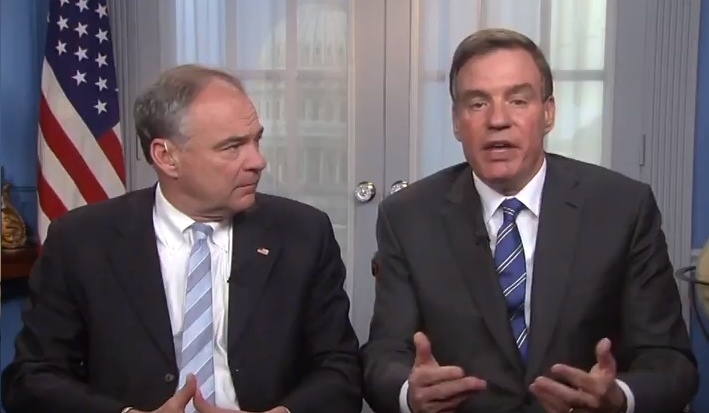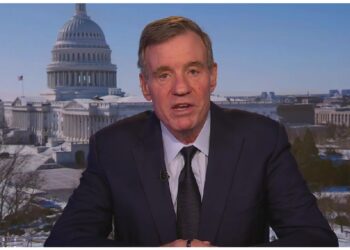From Sen. Mark Warner’s and Sen. Tim Kaine’s offices:
ICYMI: HOW VIRGINIA BENEFITS UNDER THE AMERICAN RESCUE PLAN
WASHINGTON – Today, U.S. Sens. Mark R. Warner and Tim Kaine (both D-VA) highlighted some of the ways in which the American Rescue Plan will help families, workers, small businesses and local governments across Virginia defeat COVID-19 and recover from the health and economic impacts of the virus.
“The American Rescue Plan will help us defeat the COVID-19 pandemic and put our nation on a clear path to rebuild from this crisis. Already, Virginians are seeing the benefits, with direct payments hitting bank accounts and much-needed funds going out to expand vaccine distribution, help schools reopen, and provide assistance to small businesses and local governments across Virginia,” said the Senators.
Relief Checks:
- The American Rescue Plan includes an additional round of economic impact payments for individuals making less than $80,000 and joint filers making less than $160,000
- More than 7 million people in Virginia are set to receive $9.32 billion in direct payments, helping them cover essential expenses like food, rent, and medical bills
Child Tax Credit:
- The American Rescue Plan makes the Child Tax Credit fully refundable and increases the credit amount from $2,000 to $3,000 per child age 6 to 17 (and $3,600 per child below the age of 6) for many families
- An estimated 1.5 million children across Virginia will benefit from the expanded child tax credit, including 249,000 children in the Commonwealth who are currently in poverty or deep poverty
Earned Income Tax Credit:
- 417,000 workers in Virginia will benefit from an expansion of the Earned Income Tax Credit
Enhanced Unemployment Benefits:
- The bill provides billions in additional federal relief for struggling Virginians – who are out of work through no fault of their own – by extending the historic unemployment insurance reforms established in the CARES Act, through September 6, 2021. The bill extends the Pandemic Unemployment Assistance program for the self-employed, gig workers, freelancers and others in non-traditional employment, the $300 weekly federal enhancement in benefits, and the additional weeks of federal unemployment insurance for workers who exhaust their regular state benefits. 256,320 Virginians faced the possibility of losing benefits in March or April if the programs had not been extended
Child Care:
- To help Virginians afford child care and to help ensure child care providers can continue operating safely, the American Rescue Plan includes:
- $306 million for Virginia Child Care Development Block Grant (CCDBG) programs
- $490 million for Virginia Child Care Stabilization Grants
- $16.557 million for Virginia Head Start programs
- An increase in the Child and Dependent Care Tax Credit to up to $4,000 for one child or $8,000 for two or more children, and makes the credit fully refundable. This would significantly ease the burden of child care costs for many Virginia families, who pay on average $14,063 annually for infant care and $10,867 for the care of 4-year olds
Education:
- $2.11 billion for Virginia K-12 schools: These flexible funds will support school districts in reopening safely for in-person instruction and addressing the many needs that students are facing due to the pandemic. A portion of the funds are targeted towards addressing learning loss, providing resources through the Individuals with Disabilities Education Act (IDEA), and implementing summer enrichment and afterschool programs
- $846 million for Virginia colleges & universities: Institutions must distribute half of their allocation to students in the form of financial aid awards to address hardships caused by COVID-19. The remaining portion of the funds can be used on reopening costs, revenue losses, classroom retrofits, PPE, and other expenses
Health Care
- The legislation includes $160 billion for national vaccination and other health efforts, including testing, tracing, genomic sequencing, public health staffing, and supplies to slow the spread of COVID-19
- To expand access to affordable health care nationwide, the American Rescue Plan:
- Caps premium payments: The bill lowers or eliminates premium costs on the Affordable Care Act exchange to ensure every family can find a health care plan that’s affordable to them
- Provides uninsured workers with health care: 41,000 uninsured Virginians who rely on unemployment insurance are now eligible for advance premium tax credits to help pay for essential health benefits
- Ensures jobless Virginians can keep their employer-sponsored healthcare coverage: To help Virginians who have lost their job and associated employer-sponsored healthcare coverage, the American Rescue Plan provides a 100% reimbursement so that workers who have lost their job can keep their health care coverage through COBRA
- Expands guaranteed health care coverage for new moms: The American Rescue Plan improves maternal health care with a new provision that will allow state Medicaid programs to offer new moms health care coverage for up to one year post-partum
- COVID-19 has placed an enormous strain on our nation’s healthcare system. To address this, the American Rescue Plan includes:
- $8.5 billion to help struggling rural health care providers and ensure access to care in rural areas
- $7.66 billion dollars to support public health workers in communities across the country, who are the key to getting the virus under control
- $7.6 billion in direct financial support to Community Health Centers, providing immediate relief to frontline providers in community health centers who serve communities of color and underserved populations hardest-hit by pandemic
Housing:
- To help struggling Virginians stay in their homes during the pandemic, the Commonwealth will receive $451 million for emergency rental assistance. An estimated 267,000 renters in Virginia are currently behind on their rent
- The American Rescue Plan also includes $9.9 billion to aid homeowners nationwide who are struggling to afford their mortgage payments, utility bills, and other housing costs. Virginia is expected to receive between $154 million and $276 million from this pot of money to help homeowners who have been financially stressed by the pandemic
Nutrition:
- The legislation extends a 15 percent increase in Supplemental Nutrition Assistance Program (SNAP) benefits through September 30, 2021, which will help the nearly 50 million Americans who have struggled with hunger during the pandemic. In Virginia, 503,000 adults – 9% of all adults in the state – report not having enough food to eat. This includes 308,000 adults living with children, or 15% of all adults living with children, who report that the children in their household do not have enough to eat
Small Business
- The American Rescue Plan has billions to help small businesses keep their doors open, including:
- $7.25 billion for the Paycheck Protection Program (PPP). As of this month, Virginia businesses have received $3.5 billion in forgivable Second Draw PPP loans to keep workers on the payroll during COVID-19
- $15 billion for the Targeted Economic Injury Disaster Loan (EIDL) Advance Program. As of last month, 74,664 Virginia businesses have received more than $4 billion in low-interest EIDL loans to help them survive the COVID-19 crisis
- $28.6 billion for a new Restaurant Revitalization Fund to provide grants to help small local restaurants, bars, and craft breweries stay in business and keep their workers employed. To provide comprehensive support to local restaurants, grants from the fund can be used alongside first and second Paycheck Protection Program (PPP) loans, SBA Economic Injury Disaster Loan assistance, and the Employee Retention Tax Credit
- $1.25 billion for the Shuttered Venue Operators Grant (SVOG) Program to support live entertainment venues, and a critical fix to ensure venue operators can access both PPP and SVOGs
- $10 billion in new funding for the State Small Business Credit Initiative to help small businesses grow and create jobs
Transportation & Public Transit
- To allow our frontline workers to travel to and from work and to ensure our transit systems are able to survive the pandemic and continue to serve commuters, the American Rescue Plan includes:
- $1.4 billion for transit systems in the DC metro region including WMATA
- $56 million for transit systems in Hampton Roads
- $6 million for transit in and around Blacksburg
- $342,115 for transit in and around Bristol (TN-VA)
- $5.3 million for transit in and around Charlottesville
- $817,426 for transit in and around Fredericksburg
- $884,390 for transit in and around Harrisonburg
- $542,634 for transit in and around Kingsport (TN-VA)
- $3.4 million for transit in and around Lynchburg
- $30 million for transit in and around Richmond
- $3.4 million for transit in and around Roanoke
- $219,506 for transit in and around Staunton-Waynesboro
- $3 million for transit in and around Williamsburg
- $241,677 for transit in and around Winchester
- To allow Virginia airports to weather the storm and to continue delivering crucial supplies to the Commonwealth, the American Rescue Plan includes funding for the following:
- $84 million for Washington Dulles International Airport
- $82 million for Ronald Reagan Washington National
- $18.5 million for Richmond International Airport
- $16.8 million for Norfolk International Airport
- $5 million for Charlottesville-Albemarle Airport
- $4.9 million for Roanoke-Blacksburg Regional Airport/Woodrum Field
- $3.1 million for Newport News/Williamsburg International Airport
- $1.8 million for Lynchburg Regional Airport/Preston Glenn Field
- $1.1 million for Shenandoah Valley Regional Airport
- $148,000 for Leesburg Executive Airport
- $59,000 for Virginia Highlands Airport (Abingdon)
- $59,000 for Virginia Tech/Montgomery Executive Airport
- $59,000 for Culpeper Regional Airport
- $59,000 for Danville Regional Airport
- $59,000 New River Valley Airport (Dublin)
- $59,000 for Blue Ridge Airport (Martinsville)
- $59,000 for Chesapeake Regional Airport
- $59,000 for Hampton Roads Executive Airport
- $59,000 Richmond Executive-Chesterfield County Airport
- $59,000 for Hanover County Airport
- $59,000 for Warrenton-Fauquier Airport
- $59,000 for Winchester Regional Airport
- $32,000 for Franklin Regional Airport
- $32,000 for Front Royal-Warren County Airport
- $32,000 for Twin County Airport (Galax Hillsville)
- $32,000 for Louisa County Airport/Freeman Field
- $32,000 for Luray Caverns Airport
- $32,000 for Mountain Empire Airport (Marion/Wytheville)
- $32,000 for Accomack County Airport
- $32,000 for Orange County Airport
- $32,000 for Dinwiddie County Airport
- $32,000 for New Kent County Airport
- $32,000 for William M. Tuck Airport (South Boston)
- $32,000 for Mecklenburg-Brunswick Regional Airport
- $32,000 for Stafford Regional Airport
- $32,000 for Suffolk Executive Airport
- $32,000 for Tappahannock-Essex County Airport
- $32,000 for Middle Peninsula Regional Airport
- $22,000 for Emporia-Greensville Regional Airport
- $22,000 for Farmville Regional Airport
- $22,000 for Ingalls Field (Hot Springs)
- $22,000 for Lee County Airport
- $22,000 for Tazewell County Airport
- $22,000 for Tangier Island Airport
- $22,000 for Lonesome Pine Airport (Wise)
Aid to State & Local Governments
- The American Rescue Plan provides funds to state and local governments to assist with costs associated with responding to COVID-19, support workers performing essential work during COVID-19, cover revenue losses caused by the public health emergency, or to make necessary investments in water, sewer or broadband infrastructure
- The Commonwealth of Virginia will receive $3.766 billion in direct state fiscal relief
- Virginia’s counties will receive $1.655 billion, metropolitan cities will get $628 million, and smaller cities and towns will receive $604 million
- The Commonwealth of Virginia will also receive $222 million for building out broadband and other infrastructure projects
Funding figures for individual counties and localities are available here.


















